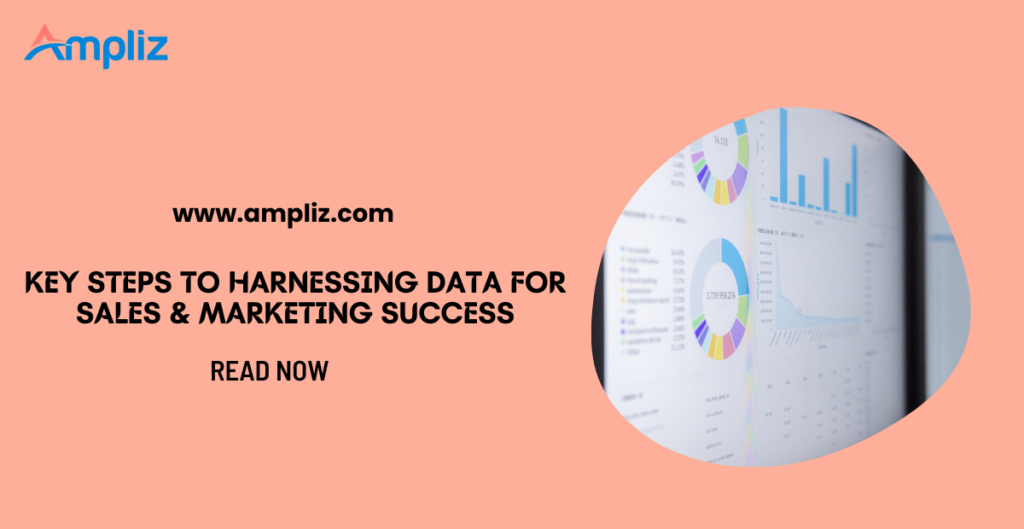In today’s competitive business landscape, data plays a critical role in helping create sales and marketing strategies that truly shine. It allows companies to move beyond guesswork, enabling targeted, efficient, and cost-effective efforts.
Additionally, by harnessing timely, relevant, and detailed data, businesses can align their offers with customer needs, boosting engagement, loyalty, and ultimately, long-term success.
In this guide, we’ll look into key steps to take for leveraging data, offering practical approaches and innovative techniques that you can implement to enhance your sales and marketing strategies.
Understanding the Benefits of Data-Driven Sales and Marketing
Today, it’s undeniable that sata drives the business world. It helps business owners and managers make decisions that are grounded in facts and insights, rather than just impressions. In sales and marketing, data plays an equally important role. It provides a clearer picture of customer behavior and helps predict market trends.
Here’s a look at some core benefits of leveraging data within your marketing and sales departments:
- Pinpoints customer preferences.
- Increases campaign efficiency.
- Enhances customer loyalty.
- Improves decision-making accuracy.
- Reduces operational costs.
- Allows better competitive analysis.
- Identifies new market opportunities.
- Facilitates precise targeting of audiences.
Ultimately, embracing data-driven strategies in sales and marketing means understanding your customers more deeply and acting on reliable insights.
Using Analytics to Predict Trends
Trend forecasting means looking ahead to see what’s coming next. It’s how businesses stay ahead in a rapidly changing world. Analytics play a major role in this process by helping to:
- Analyze historical data to find patterns.
- Map out potential future scenarios.
- Align business strategies with upcoming trends.
- Enable better inventory management.
- Refine customer engagement strategies.
- Pinpoint emerging market demands.
- Enhance risk management tactics.
By using analytics, firms can leverage a strong tool that helps them stay flexible and focused, ready to adjust to whatever happens next.
Creating Personalized Marketing Plans
Personalization in marketing is about making each interaction feel one-of-a-kind. This has never been more important than today, especially due to the rising competition and the increasing customer demand for customization.
Think of a recommendation system suggesting a movie based on past views. Or product marketing tools that remembers your favorite color and shows items in that shade first. It’s like having a tailored experience at each touchpoint!
By using past purchase data and browsing habits, companies can shape marketing campaigns that speak directly to each individual’s taste and need. This approach doesn’t just attract attention – it also helps build an authentic connection with each user, turning prospects into loyal customers.
Better Customer Segmentation with Data
Effective customer segmentation is like sorting puzzle pieces into groups based on shapes or colors – it ensures a clearer picture of your market. Data gives businesses the tools needed to categorize their customers into specific segments based on various factors like purchase history, demographics, and online behavior.
By dividing large audiences into smaller groups and segments based on certain criteria, companies can tailor their marketing strategies, reaching each segment with messages and offers that genuinely resonate.
Smarter Lead Scoring using Machine Learning
Leads are potential customers who’ve shown interest in a product or service. So, it’s easy to see how successfully identifying and prioritizing these leads plays a critical role in business success. Here’s where lead scoring comes into play.
This is a system that helps assign values to leads based on their potential to convert. Machine learning elevates this process by analyzing vast data sets to identify the best-quality leads.
Consider a pest control company looking to improve efficiency. Using specialized, tech-driven analytics tools, they can identify and target pest control leads more accurately. By understanding patterns and behaviors specific to their industry, they’re equipped to communicate effectively, ensuring their message hits the right note every time.
Targeting Customers through Behavioral Marketing
Behavioral marketing is an approach to marketing and sales based on the actions that potential customers take – like clicks on newsletters or pages visited on a website. It works by tracking these behaviors, compiling data, and using it to tailor marketing efforts to individual preferences.
This strategy allows businesses to deliver relevant content and offers that speak directly to current interests, preferences, and unfulfilled needs. In turn, thanks to this approach, customers feel more valued and understood, leading to higher user engagement levels. Plus, behavioral marketing helps companies segment their audience more effectively, allowing for precise targeting.
Making Processes Faster with Automation
Automation refers to the use of technology to handle repetitive tasks with little human intervention. In marketing and sales, automation empowers teams to focus on strategy rather than on tasks that are repetitive, mundane, or prone to human error.
Here are some processes that benefit from automation:
- Email campaign scheduling
- Social media posting
- Lead nurturing and follow-ups
- Customer data collection
- Personalized content delivery
- Inventory management
- Analytical reporting
- Customer feedback collection
- CRM updates
By streamlining these operations, automation enhances efficiency, allowing marketing teams to spend more time connecting with customers and developing creative campaigns.
Using Data Insights in the Recruitment Process
Finding the right talent is critical to success in marketing and sales. Data insights play a crucial role in refining recruitment practices, helping businesses to:
- Identify the best-fit candidates by analyzing data patterns.
- Reduce unconscious bias by assessing metrics objectively.
- Assess skills with grounded proof, reviewing the quality and reputation of institutions and certifications.
- Predict cultural fit and retention using past data.
- Streamline the interview process by pre-screening candidates.
- Improve onboarding with data-driven feedback loops.
These elements ensure that the hires not only bring talent but also align well with company culture and objectives, promising long-term contribution to success.
Using AI to Boost Customer Interaction
Building genuine relationships with customers means understanding and responding to their needs timely and accurately. AI strengthens this process by enabling personalized communication and instant responses.
Consider email marketing – AI analyzes recipient behavior, crafting content that aligns with what they’ve previously shown interest in. Thanks to AI, emails are sent at optimal times, drawing more engagement, and open rates and other data are gathered in real time.
AI also manages chatbots that provide 24/7 customer service, ensuring inquiries are resolved promptly. This smart interaction leaves customers feeling appreciated and understood, paving the way for lasting connections.
Tracking Success with Live Dashboards
Live dashboards provide a real-time snapshot of business metrics, offering a dynamic view of your sales and marketing efforts. By consolidating data from multiple sources, they give an integrated perspective on performance.
Thanks to these comprehensive tools, companies can track KPIs such as sales growth, conversion rates, and customer engagement at a glance.
Plus, interactive dashboards allow teams to drill down into specifics, identify trends, and quickly adapt to changes. It’s like having a command center at your fingertips, ready to highlight what’s working and what’s not!
Staying Ahead with New Data Trends
Remaining competitive in today’s market requires you to remain vigilant of emerging data trends. You’ll need to continuously explore advancements in data collection, analytics, and interpretation to keep your strategies and approaches up to date.
Thanks to new technologies, such as enhanced machine learning or predictive analytics, companies can improve their operations, forecast more accurately, and better understand their customers.
Embracing these trends means being proactive rather than reactive, allowing firms to offer innovative solutions before the demand peaks.
Working with Data Experts For Marketing and Sales Success
Navigating the world of data can be daunting, especially if you manage a small marketing or sales team. If plotting, gathering, or interpreting data feels overwhelming, partnering with a data expert can be a game-changer.
They bring technical skills and strategic insight, ensuring your data strategies are robust and effective. By demystifying complex data, they empower your team to make informed, confidence-driven decisions, driving your marketing and sales efforts towards success.




